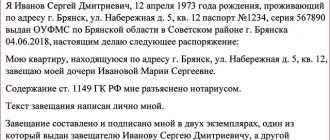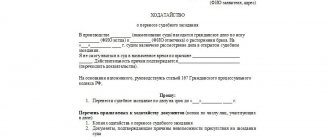Chapter 10 of the Family Code of the Russian Federation (FC RF) regulates issues of legal determination of the origin of children. If the baby is born to a couple who is not officially married, then the procedure for establishing paternity is carried out by the civil registry office on the basis of Art. 48 pp. 3, 4 IC of the Russian Federation. This document describes the conditions for the emergence of a legal relationship on a voluntary basis.
Important! In some situations, paternity is established after the death of a parent. This is done exclusively in court. Download for viewing and printing:
Family Code of the Russian Federation No. 223 Federal Law, ed. 12/30/1995
Definition and legal implications
Acknowledgment of paternity is a legal action consisting of drawing up a state record of the father in:
- the child's birth document;
- book maintained by government agencies dealing with such issues (registry office).
Attention!
When a child appears in a complete family, the spouses are automatically included as parents in his documents, regardless of biological relationship. The real parent can challenge the record through the court. In the absence of registration of marriage ties, recognition of a man as a father is carried out on the basis of:
- his will;
- consent of the woman who is the mother of the child or the official guardian;
- permission from government agencies dealing with issues of guardianship and trusteeship (in some cases);
- consent of the child himself (if he is over 18 years old).
The fact of legal recognition of paternity leads to certain legal consequences. After making the appropriate entries in the documents, the participants in legal relations receive rights and are assigned responsibilities in relation to each other.
Namely:
- a man and his family can freely communicate with the child, take care of him, and participate in all his affairs;
- the father becomes obligated to support his recognized son or daughter;
- the mother agrees to provide the opportunity for other persons to communicate with her child;
- The minor himself is given the obligation to provide assistance to the parent when he grows up.
Ordinary civilian family
Nowadays, you probably won’t surprise anyone with a civil marriage. However, from a legal point of view this is not entirely correct wording. After all, a civil marriage implies the settlement of relations through the registry office. But... Among the huge population, it is precisely the coexistence of two people on the same territory - in a house or apartment - that they are accustomed to calling a civil marriage, even if they did not formalize their relationship.
And indeed, other things being equal, a man and a woman represent a full-fledged unit of society, albeit without a stamp in their passports. But when a baby is born in such a family, both parents must go to the registry office so that paternity is established. This procedure is not complicated or long. The choice of the surname of a toddler who was born out of wedlock depends only on the parents - as they decide, so it will happen.
Conditions for voluntary recognition of paternity in 2021
Recognition of participation in the birth of a child is irrevocable. Having once agreed to paternity, a person can revoke it only in court. Since this legal action has no deadline, you need to take into account the following nuances:
- A man must have a certain level of consciousness in order to participate in the process. This means that an incapacitated citizen cannot submit a corresponding application.
Attention! The exception is cases of incomplete limitation of legal capacity, for example, only in relation to property rights. This prohibition on expression of will also applies to minor parents.
- There are no restrictions on the period of expression of will regarding recognition of oneself as a father. It can be carried out even after the son or daughter comes of age (the citizen’s official consent to such an act is required).
- If a government agency has already carried out the necessary work to make an act record, it can be changed by filing a corresponding statement of claim in court.
Important! A man who admits to being the parent of children with whom he has no biological connection loses the right to renounce this legal declaration. An exception is the detection of deception (the man did not know that he was not the father).
Instead of help - only problems
A woman must understand that if a voluntary recognition of paternity is not received from a man, and this issue is resolved in certain instances, and even a positive decision is made for her and the child, a negligent father will not love the baby. He can only cause him a lot of problems later. For example, such a “caring” father may get “lost”, and if the child needs to go abroad, he will have to look for his father, because he gives permission to leave. Therefore, the mother needs to think carefully about what possible consequences may happen after the struggle she has begun.
A mother who files such a claim will have to collect evidence, which will later be used in court to prove her case. Acquaintances, neighbors or colleagues will come up, that is, all those who can confirm that the parents lived together and ran a common household.
Procedure for recognizing paternity
To enter the necessary information into official documents, to recognize a man as the parent of a child, you need to:
- father and mother should file jointly when the marriage was not registered;
- both express their will if the child’s certificate contains a dash or the parent’s name written in according to the woman.
Parent registration is carried out:
- before the birth of a newborn (in exceptional cases);
- together with the issuance of the child’s birth certificate;
- after registration of the newborn, if information about the father is missing or entered according to the mother.
Upon the unilateral application of a man, his paternity can be registered with the permission of the guardianship authorities if the mother:
- died (there is a corresponding document);
- recognized by the court: missing;
- incapacitated;
Joint statement from parents
Registration of a record of the child’s father can be accepted by the civil registry office at any time. To do this, citizens need to collect documents and go to the institution:
- together (preferred);
- separately (if the first is not possible);
- by sending a notarized document on the expression of will.
At the registry office, an application is filled out using one of the forms approved by government decree No. 1274 of October 31, 1998:
- No. 12 is intended for a couple who has not registered a marriage;
- No. 13 must be filled out by a man whose wife has died.
Application structure
The logic of the expression of will is as follows:
- the man declares in writing that he recognizes himself as the father of such and such a child, including indicating his: full name;
- floor;
- date and place of birth (based on the relevant certificate);
Important! The application ends with a request to register paternity, indicating the child’s preferred personal data: full name and nationality (optional).
The procedure for voluntary recognition of paternity can be carried out at the Civil Registry Office:
- where the child’s birth certificate was issued (if the father is not listed on it);
- at the place of registration of one of the parents;
- in the area where the judicial authority that recognized paternity is located.
Attention! The state body is obliged:
- accept the application;
- within one month:
- make an appropriate entry in the birth book;
- change the data in the child’s document or issue a new one (at the request of both parents).
Other application options
If there are serious circumstances, a preliminary statement of paternity may be written. The man and woman must attach a pregnancy certificate to the package of documents.
Such an application is accepted by the registry office and stored until the actual birth of the baby. It is processed when issuing a birth certificate.
A preliminary expression of will is allowed if the parent:
- seriously ill (there is a doctor’s certificate);
- moves to another state for permanent residence;
- is going on a long business trip.
Important!
The preliminary expression of will is not irrevocable. The father can refuse him.
- If it is impossible to submit a joint application, a man and a woman can express their will separately. Everyone submits an application with appropriate content.
- If a citizen is physically unable to personally visit the registry office, he is allowed to send a completed form by mail. The document must be notarized.
- Parents permanently residing abroad (or one of them) submit a voluntary application at the Russian consulate.
About the state duty
Applicants are required to attach a receipt for payment of the state fee to the documents. The amounts are established by the Tax Code of the Russian Federation (TC). In particular, the state duty is specified in paragraph 1.3 of Article 333.26 of the Tax Code. A small amount will be charged for:
- child's birth certificate form;
- making an entry in the registration book.
Attention! Please note that the amount of state duty depends on the type of service. In 2021 it was:
- 350 rubles if changes are made to the certificate;
- 650 rubles if a document replacement is required.
Download for viewing and printing:
Tax Code of the Russian Federation (part two) dated 05.08.2000 N 117-FZ.doc
Obtaining a certificate
Proven paternity must be confirmed through an issued certificate.
To obtain a certificate, the plaintiff will need:
- Obtain a written copy of the court order.
- Take the baby's birth certificate and your passport.
- Pay the required state fee.
- Come to the registry office.
- Fill out an application for the issuance of the appropriate form.
The result of these actions will be the receipt of a certificate of paternity and the entry of new information into the civil register.
Video: Establishing paternity
Download:
Claim to establish paternity and collect alimony without marriage - Sample.doc
Similar articles:
- The procedure for establishing paternity at the registry office
- DNA paternity test
- Responsibilities of parents to children
- What does improper performance of parental responsibilities mean?
- Responsibilities of godparents
- Previous entry Certificate of paternity
- Next entry What is surrogacy and the cost of the service
1 comment on the article “How to prove paternity outside of marriage?”
- V
Irina writes:It's all great, but you can find it in other places too. But what should a father do who wants to acknowledge paternity, but the child’s mother, relatively speaking, a casual acquaintance, insists that the child is not his, does not allow them to communicate, and certainly does not agree to a DNA test?
Answer
Package of necessary documents
The procedure for establishing paternity rights is carried out on the basis of certain documents certifying all the circumstances of the case.
These include:
- identity cards (passports) of citizens;
- child birth certificate (if it was issued earlier than this application);
- birth certificate from the maternity hospital (during the initial registration of the child);
- a receipt confirming the payment of the required amount of state duty to the relevant government accounts;
- consent of an adult son or daughter (if paternity has not been established previously).
Attention! If a man submits an application alone, then additionally he should attach:
- permission from the guardianship authority (issued accordingly);
- the court's decision.
In what cases will the issue not be resolved through the registry office?
Family law describes options for the development of events in which it is impossible to make a record that a man recognizes himself as a father in the registry office. They boil down to the following:
- The man died without having time to make an official declaration of will recognizing himself as the father of the child.
- The woman does not give her consent to change the birth record of her son or daughter.
- There is already a man who has recognized himself as the legal parent.
- The adult child does not agree to recognize the applicant as his parent.
Attention! To resolve the issue, it is necessary to go to court. Only this body is allowed to examine issues of establishing paternity in controversial situations.
Additional Information
The issues of determining and officially establishing paternity are replete with various nuances. Here are the answers to the most frequently asked questions.
- The fact that a man is recognized as a father does not automatically lead to the withholding of alimony payments from him. To assign them you need:
- sign a voluntary agreement and have it certified by a notary;
- obtain a court decision.
- The registry office authorities do not have the legislative right to find out whether the applicant is the biological father of the child. Only the court can determine this.
- If a child is declared incompetent, then all decisions regarding him are made with the participation of the guardianship authorities.
- The trustee of an incapacitated man also does not have the right to decide for him issues related to the recognition of paternity. Such cases are dealt with in court.
Is it possible to negotiate with the child’s father on voluntary payment of child support?
Current legislation does not prohibit drawing up a written agreement confirming the voluntary fulfillment of alimony obligations by the child’s father, even if the spouses have never been officially married. The document certified by a notary contains the following information:
- Father and mother.
- The child for whom child support will be paid.
- Period and amount of planned payments.
- Liability for failure to comply with the obligations of this agreement.
If the document is drawn up according to all the rules, then it can be used as a writ of execution. The law does not provide for other forms for paying alimony on a voluntary basis.






